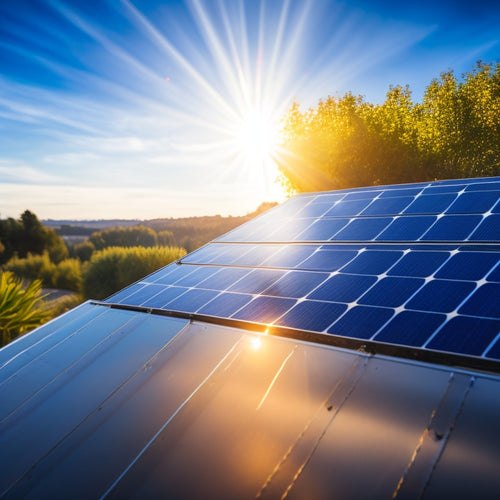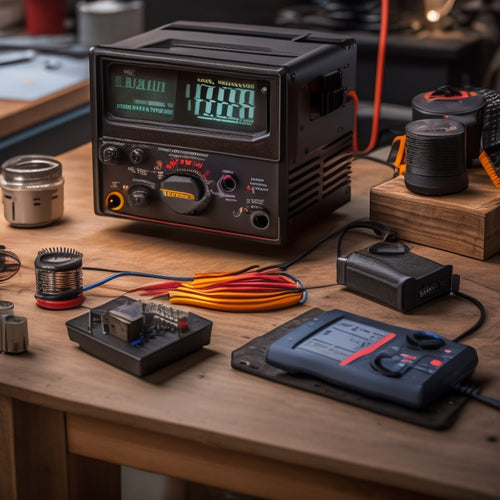
Lithium Ion Battery Solutions for Independent Living
Share
You're opting for a life of independence, powered by renewable energy and lithium-ion batteries. These batteries offer high energy density, reduced weight, and a low self-discharge rate, making them ideal for off-grid living. By integrating them with solar power, you can store excess energy and guarantee a stable supply. To maximize their performance, you'll need to monitor their wear, avoid extreme temperatures, and maintain a balanced charge. As you explore the benefits of lithium-ion batteries for independent living, you'll discover how customized solutions can secure peak performance and provide a competitive edge in the industry - and there's more to explore on this topic.
Key Takeaways
• Lithium-ion batteries enable independent living by providing high energy density and low self-discharge rates for off-grid solar power systems.
• Customized lithium-ion solutions ensure peak performance, reliability, and energy independence for rural living and homesteading lifestyles.
• Effective battery management systems and monitoring ensure optimal energy harvesting, storage, and utilization for uninterrupted power supply.
• Lithium-ion batteries offer a low-maintenance and environmentally friendly alternative to traditional energy sources, reducing carbon footprint and energy costs.
• Solar panel battery charging optimization and proper system sizing are crucial for efficient energy conversion and prolonged battery lifespan.
Lithium Ion Battery Advantages
Moreover, lithium ion batteries offer you a high energy density, meaning they pack a lot of power relative to their size and weight, making them ideal for portable electronics and electric vehicles.
This high energy density also enables you to reduce the overall weight and size of your devices, making them more portable and convenient to use.
Additionally, lithium ion batteries have a low self-discharge rate, which means they retain their charge even when not in use, reducing the need for frequent recharging. This feature not only saves you time but also leads to cost savings in the long run.
Moreover, lithium ion batteries have a lower environmental impact compared to traditional lead-acid batteries. They contain fewer toxic materials and are more recyclable, making them a more environmentally friendly option.
Off Grid Solar Power Systems
By incorporating lithium-ion batteries into off-grid solar power systems, you can harness the sun's energy more effectively and store excess power for later use. This setup is particularly beneficial for rural development, where access to traditional energy grids may be limited.
To guarantee a smooth shift to off-grid living, consider the following essential factors:
-
System Sizing: Properly size your solar panel array and battery bank to meet your energy demands.
-
Energy Efficiency: Optimize your energy usage by selecting energy-efficient appliances and lighting.
-
Battery Management: Implement an effective battery management system to monitor and control your lithium-ion batteries.
- System Monitoring: Install a monitoring system to track your energy production and consumption in real-time.
Renewable Energy Storage Options
As you explore renewable energy storage options, you'll need to take into account how to effectively integrate solar power into your system.
Energy storage systems play an essential role in ensuring a stable and reliable supply of energy, especially in off-grid scenarios.
Solar Power Integration
When integrating solar power into your renewable energy system, you'll need a reliable energy storage solution to stabilize the grid and guarantee a steady supply of electricity. This is where lithium-ion batteries come in - providing a stable and efficient way to store excess energy generated by your solar panels.
By incorporating solar power into your energy grid, you can greatly reduce your reliance on the traditional grid and enjoy the benefits of clean, renewable energy.
Here are some key benefits of integrating solar power with lithium-ion batteries:
-
Increased Energy Independence: Store excess energy generated by your solar panels and use it when you need it.
-
Improved Grid Stability: Lithium-ion batteries help stabilize the energy grid, reducing the risk of power outages and fluctuations.
-
Efficient Energy Storage: Store energy during the day and use it at night, reducing your reliance on traditional energy sources.
- Reduced Carbon Footprint: By using clean, renewable energy, you can significantly diminish your carbon footprint and contribute to a more sustainable future.
Energy Storage Systems
You can choose from a range of energy storage systems, including advanced lithium-ion batteries, to optimize your renewable energy setup and guarantee a reliable supply of electricity. Energy storage systems are designed to store excess energy generated by your solar panels or wind turbines, allowing you to use it when you need it. This secures a stable and consistent power supply, even during periods of low energy production.
Advanced energy storage systems, like lithium-ion batteries, offer improved efficiency, longer lifespan, and reduced maintenance. They can also be integrated with energy forecasting systems to optimize energy usage and reduce waste. Energy forecasting uses machine learning algorithms and historical data to predict energy demand, allowing you to store excess energy during periods of low demand and use it when needed.
In addition, energy storage systems can help stabilize the power grid by providing a buffer against grid fluctuations. This makes them an essential component of a reliable and efficient renewable energy system. By choosing the right energy storage system, you can secure a consistent and reliable supply of electricity, even when the grid is unstable.
Off-Grid Energy Solutions
Opt for off-grid energy solutions that integrate renewable energy storage options, such as advanced lithium-ion batteries, to power your remote or isolated locations independently of the grid. By selecting off-grid energy solutions, you can guarantee a reliable and sustainable power supply, perfect for rural areas where traditional grid connections are limited.
Here are some benefits of off-grid energy solutions:
-
Rural electrification: Off-grid energy solutions can bring electricity to rural areas, empowering communities and improving living standards.
-
Energy independence: With off-grid energy solutions, you're not reliant on the grid, giving you control over your energy usage and costs.
-
Environmental benefits: Renewable energy sources like solar and wind power reduce carbon emissions, contributing to a cleaner environment.
- Community empowerment: Off-grid energy solutions can enable community-based energy systems, promoting energy self-sufficiency and community development.
Lithium Ion Battery Maintenance
Properly maintaining your lithium-ion batteries is vital to extending their lifespan and ensuring peak performance. Neglect can lead to a significant reduction in capacity and overall health. You'll want to keep a close eye on battery wear, which occurs when your batteries undergo repeated charge and discharge cycles.
This wear and tear can be measured by tracking your cycle count, indicating the number of times your batteries have been fully discharged and recharged.
To minimize battery wear, it's essential to avoid extreme temperatures, deep discharging, and high charge rates. Make sure your batteries are balanced and calibrated regularly to prevent cell damage. By doing so, you'll be able to maximize your batteries' capacity and extend their lifespan.
Additionally, monitoring your batteries' state of charge and state of health will help you identify any potential issues before they become major problems.
Solar Panel Battery Bank Design
With a well-maintained lithium-ion battery bank in place, designing an efficient solar panel battery bank becomes the next critical step in creating a reliable off-grid energy system. You'll want to make sure that your solar panel array is properly sized to charge your battery bank efficiently.
Here are some key considerations to keep in mind:
-
Battery Sizing: Make sure your battery bank is sized correctly to handle the maximum power output of your solar panel array.
-
Cable Management: Properly route and manage cables to minimize power loss and ensure safe operation.
-
Array Configuration: Optimize your solar panel array configuration to maximize energy harvest during peak sun hours.
- Monitoring and Control: Implement a monitoring and control system to track performance, detect issues, and optimize energy production.
Off Grid Energy Independence
As you consider off-grid energy independence, you're likely thinking about how to harness renewable energy sources to power your life.
You'll need a complete renewable energy system that incorporates energy storage solutions, such as lithium-ion batteries, to guarantee a reliable and efficient supply of power.
Renewable Energy Systems
You can achieve off-grid energy independence by harnessing renewable energy sources, such as solar, wind, and hydro power, and storing excess energy in lithium-ion batteries for later use. This approach enables you to reduce your reliance on the grid and minimize your carbon footprint.
By integrating Clean Tech and Green Infrastructure into your renewable energy system, you can create a sustainable and self-sufficient energy solution.
Here are some benefits of renewable energy systems:
-
Reduced energy costs: Generate your own energy and reduce your dependence on the grid.
-
Increased energy independence: Store excess energy in lithium-ion batteries for later use.
-
Environmental benefits: Reduce your carbon footprint and contribute to a cleaner environment.
- Enhanced energy security: Ensure a reliable energy supply, even in remote or off-grid locations.
Energy Storage Solutions
Choosing energy storage solutions is crucial for achieving off-grid energy independence, as they allow you to store surplus energy generated by renewable sources for later use. This surplus energy can be used during periods of low energy production, ensuring a stable and reliable power supply. Effective energy planning is critical in designing an off-grid energy system, and energy storage solutions play an essential role in this process.
| Energy Storage Solution | Capacity | Cycle Life |
|---|---|---|
| Lithium-Ion Battery | 10 kWh | 3000 cycles |
| Lead-Acid Battery | 5 kWh | 500 cycles |
| Flow Battery | 20 kWh | 1000 cycles |
| Sodium-Ion Battery | 8 kWh | 2000 cycles |
| Zinc-Air Battery | 12 kWh | 1500 cycles |
When selecting an energy storage solution, consider factors such as capacity, cycle life, and cost. A suitable energy storage solution will provide grid resilience, ensuring that your off-grid energy system remains stable and efficient. By integrating the right energy storage solution into your system, you can enjoy a reliable and sustainable supply of energy, even when the grid is unavailable.
Grid-Free Living Options
Embracing off-grid energy independence enables individuals to break free from reliance on public utilities, creating a self-sustaining lifestyle that's environmentally friendly and cost-effective. You can live life on your own terms, enjoying the freedom and security that comes with being energy-independent.
By leveraging advanced lithium-ion battery solutions, you can:
-
Power your homesteading lifestyle: Generate your own energy and store it efficiently, ensuring a steady supply of power for your rural retreat.
-
Reduce your carbon footprint: Ditch fossil fuels and adopt a cleaner, greener way of living that's kinder to the environment.
-
Save money on energy bills: Break free from the grid and stop relying on public utilities, slashing your energy costs in the process.
- Enjoy uninterrupted power supply: With advanced battery solutions, you can rest assured that your power will stay on, even when the grid goes down.
Lithium Ion Battery Technology
Lithium ion battery technology has revolutionized the portable electronics industry by providing a high-energy-density power source that enables longer battery life and reduced device weight. You may be wondering how this technology has evolved over time. Let's take a brief look at the lithium history. The discovery of lithium dates back to 1817, but it wasn't until the 1990s that lithium-ion batteries gained popularity.
Here's a snapshot of the battery roadmap:
| Year | Milestone |
|---|---|
| 1991 | Sony commercializes the first lithium-ion battery |
| 2005 | Lithium-ion batteries become widely used in portable electronics |
| 2010 | Research focuses on improving energy density and reducing costs |
| 2020 | Solid-state batteries emerge as a promising next-generation technology |
You can see how far we've come with lithium-ion battery technology. As you explore independent living options, it's crucial to understand the advancements in this field. With continued innovation, lithium-ion batteries are poised to play an important role in achieving energy independence.
Solar Panel Battery Charging
As you explore solar-powered energy independence, you'll need to consider how to harness the sun's energy to charge your lithium-ion batteries efficiently. A vital aspect of this process is understanding solar panel battery charging.
To maximize your energy harvest, consider the following key factors:
-
Panel Efficiency: Guarantee your solar panels boast high efficiency ratings to convert sunlight into electrical energy effectively.
-
Charging Cycles: Optimize your charging cycles to prolong the lifespan of your lithium-ion batteries, reducing the need for frequent replacements.
-
Solar Panel Orientation: Strategically position your solar panels to capture the best amount of sunlight, considering factors like angle, direction, and shading.
- Monitoring and Control: Implement a reliable monitoring and control system to track your energy production, storage, and consumption, ensuring a seamless off-grid experience.
Off Grid Lithium Ion Systems
When you're designing an off-grid lithium ion system, you're likely relying on a renewable energy source, such as solar or wind power. This means you'll need to take into account your energy storage needs carefully, as you won't have grid power to fall back on.
Renewable Energy Source
You can greatly reduce your reliance on the grid by harnessing renewable energy sources, such as solar or wind power, in conjunction with off-grid lithium-ion systems. This clean fuel approach enables you to tap into nature's abundance, reducing your carbon footprint and dependence on fossil fuels.
By integrating renewable energy sources with lithium-ion batteries, you can create a sustainable and efficient energy solution for your off-grid needs.
Here are some key benefits of combining renewable energy sources with off-grid lithium-ion systems:
-
Decreased energy costs: Harnessing renewable energy sources can substantially reduce your energy expenses.
-
Enhanced energy independence: By generating your own clean energy, you're less reliant on the grid and its associated costs.
-
Environmental benefits: Renewable energy sources produce zero emissions, contributing to a cleaner, healthier environment.
- Reliable energy supply: With a lithium-ion battery backup, you can store excess energy generated during the day for use during the night or on cloudy days.
Energy Storage Needs
By integrating renewable energy sources with off-grid lithium-ion systems, you've taken a significant step towards energy independence, but it's equally important to guarantee you have a reliable energy storage solution to match your unique energy needs.
This is where energy forecasting comes in – accurately predicting your energy usage patterns to make sure your storage system can meet your demands. In urban planning, this is particularly vital, as it enables you to optimize your energy infrastructure and minimize waste.
To achieve this, you'll need to assess your energy usage patterns, taking into account factors such as seasonal variations, time-of-use tariffs, and appliance efficiency. By analyzing these factors, you can determine the best energy storage capacity and configuration for your off-grid system.
A well-designed energy storage system won't only ensure a reliable supply of power but also provide a cost-effective solution that maximizes your return on investment. By getting your energy storage needs right, you'll be able to enjoy the full benefits of off-grid living, free from the constraints of traditional grid dependency.
Off-Grid Reliability
Reliable off-grid lithium-ion systems hinge on the ability to maintain a consistent power supply, even during periods of low renewable energy input, ensuring your off-grid lifestyle remains uninterrupted.
You've made the conscious decision to live off the grid, and you expect your power system to keep up with your needs. That's why it's essential to invest in a lithium-ion battery solution that can provide a stable and efficient energy supply.
Here are 4 key benefits of off-grid lithium-ion systems:
-
Uninterrupted Power Supply: With a reliable lithium-ion system, you won't have to worry about power outages disrupting your daily routine.
-
Rural Living Made Easy: Off-grid lithium-ion systems are perfect for rural living, where traditional power grid connections may be unreliable or non-existent.
-
Energy Independence: Take control of your energy needs and reduce your reliance on the grid.
- Low Maintenance: Lithium-ion batteries require minimal maintenance, giving you more time to focus on what matters most.
Customized Lithium Ion Solutions
Customized lithium ion solutions enable companies to tailor their battery packs to meet specific requirements, guaranteeing peak performance and efficiency in their unique applications. You can benefit from battery customization to suit your specific needs, whether it's for off-grid energy storage or powering electric vehicles. By integrating tailored solutions, you can optimize energy density, power output, and lifespan to match your application's demands.
Solution integration is a critical aspect of customized lithium ion solutions. You'll work closely with experts to design and develop a bespoke battery pack that seamlessly integrates with your system. This ensures that your battery solution is optimized for maximum performance, reliability, and safety.
With customized solutions, you can overcome the limitations of standard battery packs and discover new possibilities for your business. By leveraging advanced battery technologies and innovative design, you can create a competitive edge in your industry. Whether you're driving innovation in renewable energy, electric mobility, or industrial applications, customized lithium ion solutions can help you achieve your goals.
Frequently Asked Questions
Can Lithium Ion Batteries Be Used for Electric Wheelchairs?
"You'll find lithium-ion batteries ideal for electric wheelchairs, boosting wheelchair performance with high energy density and long cycle life, while ensuring battery safety through built-in protection circuits and smart charging systems."
How Long Do Lithium Ion Batteries Last in Storage?
When you store lithium-ion batteries, you'll experience minimal battery degradation, but it's essential to maintain a consistent, cool temperature, and avoid deep discharge, as you're storing them in self-storage, to prolong their lifespan, typically up to 2 years.
Are Lithium Ion Batteries Compatible With All Solar Panels?
You'll find that lithium-ion batteries are compatible with most solar panels, but peak performance depends on Panel Efficiency and seamless System Integration, ensuring a harmonious energy storage and generation setup.
Can I Mix Old and New Lithium Ion Batteries Together?
As you navigate the complex world of energy storage, a wise question arises: can you mix old and new lithium ion batteries together? In a word, no - it's a recipe for discord, disrupting battery harmony and reducing cycle life.
Do Lithium Ion Batteries Require Special Disposal Procedures?
You're right to wonder: do lithium-ion batteries require special disposal procedures? Yes, they do, as improper disposal can harm the environment. You should recycle them to minimize environmental impact, overcoming recycling challenges that can lead to pollution and waste.
Related Posts
-

Diy Off Grid Solar
By embracing DIY off-grid solar, you can break free from grid dependence, slashing your energy bills by up to 90% and...
-

How Efficient Are Thin Film Solar Cells
Thin film solar cells provide an innovative approach to energy generation, boasting efficiency rates generally betwee...
-

Key Features of a DC to AC Converter
A DC to AC converter features high efficiency and conversion rates, which reduce energy costs and improve performance...


